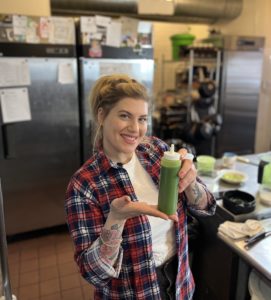
Underground punk shows are not usually a destination for those looking for vegan sandwiches.
Nevertheless, upon entering a DIY concert in Philadelphia in 2008, you might have found chef Rachel Klein selling wrapped sandwiches and iced tea to sweaty patrons, tucked between the merch tables of band T-shirts.
“My payment for having the table was just to feed the headlining bands,” she said.
Klein, 37, has come a long way since her tabling days. Now the executive chef and creator of Miss Rachel’s Pantry, she traded sandwich slinging for meal services and catering, opened up her first storefront in 2012, and moved to her 1938 S. Chadwick St. location in 2015.
Miss Rachel’s Pantry hosts weekly public dinners booked out a month in advance, private events and occasional pop-ups, serving plant-based eats, including takes on Ashkenazi dishes, such as hearts of palm whitefish salad and carrot lox. Klein hosts a monthly cooking show “Beat Your Meat” for her Patreon members, walking her audience step-by-step through a recipe.
With her vegetable-forward philosophy, Klein is committed to cooking dishes by making the most of fresh ingredients, leaning into the complexitie flavor plants are able to give.
“Our entrees are very, like, ‘What can we do with this vegetable?’ versus, like, ‘How do we make this taste like meat?’” Klein said.
Along with another line cook, a pastry chef, two prep cooks and a couple front-of-house staff, Klein and her staff pride themselves on good hospitality as much as their food.
“Our food is really good,” Klein said. “But it tastes better because we’re nice.”
Klein’s inclination toward good service came from her Jewish roots. Growing up in Northeast Philadelphia, Klein accompanied her mother and sister to Friday night services, while her father, Inquirer food writer Michael Klein, was often working. Klein’s mother was in charge of setting up for oneg after synagogue services, and Klein and her sister would help, alternating sneaking bites of pastries with putting them out on trays.
For the holidays, the family would cram into her grandmother’s small rancher home, and her bubbe, to accommodate Klein’s vegetarian-since-kindergarten diet, would plop matzah balls into store-bought vegetable broth, “which wasn’t very good, but I appreciated it.”
On a quest to recreate her grandmother’s dishes, Klein began cooking and, after graduating from Temple in 2007, began taking various restaurant jobs.
Along the way, she experienced and witnessed firsthand the maltreatment of working in the industry. Klein remembers her superiors dragging a delivery boy by the ear and turning away a server who showed up soaking wet after trekking in the rain to arrive for her shift.
“One of the reasons why the restaurant is the way it is is because I never want to subject people to some of the experiences that I had,” Klein said.
As Klein found her footing at Miss Rachel’s Pantry, she made an effort to collaborate with other women in the restaurant industry, including chef Stephanie Reitano of the now-closed Capofitto Forno in Old City. Klein would supply beet pepperoni for Capofitto’s pizza and made a take on arancini, fried rice balls, by deep frying matzah balls and serving them over a carrot puree.
“It was really formative to me to see someone I look up to — Stephanie, who’s such a good cook — embrace the way that I cook, and it made me feel kind of validated in a way,” Klein said.
Growing diversity in the restaurant industry has helped shift the culture from abusive to collaborative. As much as Klein is working to give her diners a positive experience, she’s looking to do the same for her workers.
As restaurants have a harder time hiring, Klein believes keeping employees is a matter of making sure they are paid well and not overworked, one of the reasons Miss Rachel’s Pantry’s dinner schedule is limited and why it no longer offers catering. Klein also hopes customers are understanding of when the price of dishes increases; it’s reflective of the work that goes into making the food taste good by people who, in Klein’s words, spend almost all of their time preparing the restaurant’s food.
“You want to make sure your people are taken care of,” Klein said.






